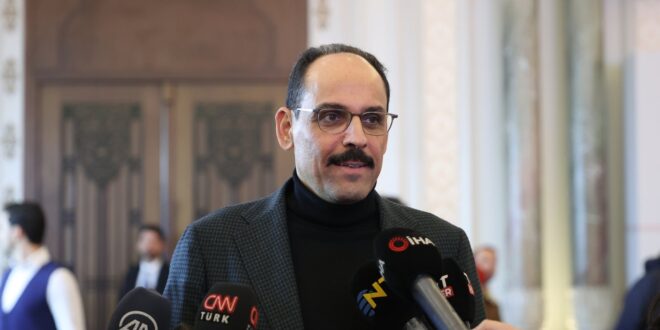Türkiye only coordinates with its allies, Presidential Spokesperson Ibrahim Kalın said on Sunday, according to the Daily Sabah.
Türkiye does not seek permission for its security operations in Syria, and it only coordinates with its allies, Presidential Spokesperson Ibrahim Kalın said on Sunday.
“We won’t seek anyone’s consent when faced with a national security threat,” Kalın told Qatari broadcaster Al-Jazeera in an interview.
“In regards to the political situation in Syria, of course, it remains a source of threat and uncertainty for everyone, not just for us, but for Iraq, for Jordan and other countries as well (and) Europe, etc.,” he said.
Last month Türkiye launched Operation Claw-Sword in northern Iraq and Syria, a cross-border aerial campaign against the PKK terrorist group and its Syrian offshoot, the YPG, which have illegal hideouts across the Iraqi and Syrian borders where they plan and sometimes execute attacks on Turkish soil.
The operation was launched days after the PKK/YPG carried out a bomb attack on Istanbul’s popular Istiklal Street, killing six people and injuring 81.
After the air operation began on Nov. 20, President Recep Tayyip Erdoğan also signaled an impending ground operation in northern Iraq and northern Syria to eliminate the terrorist threat, adding: “This is not limited to just an air operation.”
The president specified northern Syria’s YPG-controlled Tal Rifaat, Manbij and Ain al-Arab (Kobani) regions as possible targets to clear of terrorists.
Kalın explained that Türkiye’s initial response after the attack “was to coordinate and conduct several air operations.”
“We have established very clearly that YPG was behind this attack. We have the person who brought the bomb and carried out the attack, but also people who facilitate the arrival of that person – a lady,” he said.
“In recent years, the PKK has changed its tactics. Rather than using Syrian, say Kurds or others, they are using other people from different nationalities. To kind of cover themselves up,” he said.
Kalın rejected claims that Turkish airstrikes had endangered U.S. soldiers, reiterating that Ankara does not target civilians or American or Russian soldiers.
“We have a de-conflicting mechanism with the Russians and the Americans. We don’t target Russian or American soldiers or military posts in Syria or anywhere else. Our targets are PKK/YPG elements, and we tell them to stay away from those elements,” he said.
“The YPG is using at one point the American flag, at another point the (Syrian) regime flag to protect itself … sometimes they do this with the Russians, less so recently, but in the past. This to me shows YPG is using its alliance with the U.S. to legitimize its presence in northern Syria,” he added.
Kalın also pointed out that under a deal signed in 2019, the U.S. was supposed to make YPG/PKK terrorists move 30 kilometers (18 miles) away from the Turkish border, but the agreement was never implemented.
On Syria’s political situation, he said Ankara “will continue to support the legitimate Syrian opposition … even though almost the entire world has forgotten them,” including the U.S., Europe and many Arab countries.
Regarding a possible meeting between President Erdoğan and Syrian regime leader Bashar Assad, Kalın said: “We don’t have an immediate plan for such a meeting, but our president is sending a message: If you act responsibly, if you address the security concerns and allow the political process to move forward, then I might be prepared to take that step.”
Throughout this year, Erdoğan has been threatening a new military operation into the region and calling for a safe zone to protect Türkiye against cross-border attacks from Syrian territory. He upped his threats in the wake of November’s terrorist attacks.
“We know the identity, location, and track record of the terrorists. We also know very well who patronizes, arms and encourages terrorists,” Erdoğan also recently said, referring to the U.S. support for the YPG.
The PKK is a designated terrorist organization in the U.S., Türkiye and the European Union and Washington’s support for its Syrian affiliate has been a major strain on bilateral relations with Ankara. The PKK/YPG has controlled much of northeastern Syria after Assad’s forces withdrew in 2012.
The U.S. primarily partnered with PKK/YPG terrorists in northeastern Syria in its fight against the Daesh terrorist group. On the other hand, Türkiye strongly opposed the PKK/YPG’s presence in northern Syria.
Under the pretext of fighting Daesh, the U.S. has provided military training and given truckloads of military support to the PKK/YPG, despite its NATO ally’s security concerns. Underlining that one cannot support one terrorist group to defeat another, Türkiye has conducted its counterterrorism operations throughout, removing a significant number of terrorists from the region.
Since 2016, hailing its right of self-defense under Article 51 of the United Nations Charter, Türkiye has launched a trio of successful counterterrorism operations across its border in northern Syria to prevent the formation of a terror corridor and enable the peaceful settlement of residents: Euphrates Shield (2016), Olive Branch (2018) and Peace Spring (2019).
 Eurasia Press & News
Eurasia Press & News


